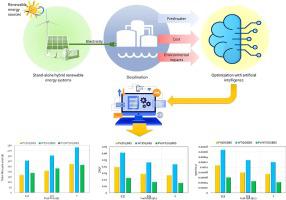Energy Conversion and Management ( IF 9.9 ) Pub Date : 2021-12-01 , DOI: 10.1016/j.enconman.2021.115064 Mohammadali Kiehbadroudinezhad 1, 2, 3 , Adel Merabet 1 , Ali Rajabipour 3 , Michael Cada 2 , Shahideh Kiehbadroudinezhad 4 , Majid Khanali 3 , Homa Hosseinzadeh-Bandbafha 3

|
Although freshwater is necessary for the well-being of humankind, increasing population growth and limited resources lead to a serious crisis to supply freshwater. Since the Earth is surrounded by seawater, desalination based on electrical power is introduced as a promising technology to provide freshwater. It is well documented that the connection of remote areas that usually do not have access to freshwater into the electricity grid is not affordable and eco-friendly. Hence, the efforts to design and construct high reliability, cost-effective, and eco-friendly stand-alone hybrid renewable energy system in remote areas. In line with this, this paper describes a novel energy management system for the optimized operation of a stand-alone hybrid energy system based on photovoltaic panels, wind turbines, batteries, and diesel generator. For this purpose, a multi-objective optimization problem is formulated by combining three objective functions, i.e., minimum the total life cycle cost as well as environmental impacts on human health and ecosystems and the maximum system reliability that can conflict with each. To solve the multi-objective optimization problem, a division algorithm is proposed that is more flexible and faster compared with conventional algorithms such as genetic algorithm. In order to show the proposed framework, a real case study in Larak Island, Iran, with appropriate solar and wind is considered. The effectiveness of the applied approach compared with optimization results of genetic algorithm and the artificial bee swarm optimization algorithm that was previously used successfully to solve optimization problems related to desalination integrated with the renewable energy system. The optimization is performed based on different diesel fuel price amounts (0.2, 0.5, and 1 $/liter). It is seen that at fuel price set to 0.2 and 0.5 $/liter, the seawater reverses osmosis desalination/photovoltaic/diesel generator/battery is the most cost-effective energy system, and when fuel price is 1 $/liter, the seawater reverses osmosis desalination/photovoltaic/wind turbine/diesel generator/battery is the most cost-effective hybrid system. While at fuel price set to 0.2, 0.5, and 1 $/liter, the seawater reverse osmosis desalination /photovoltaic/wind turbine/diesel generator/battery is the most eco-friendly. Finally, the results of this study show proposed algorithm is faster and more accurate (100 iterations, 98.36% accuracy) than the genetic algorithm (1000 iterations, 83.03% accuracy) and the artificial bee swarm optimization (300 iterations, 95.49% accuracy).
中文翻译:

考虑人体健康和环境影响的水电联产划分算法优化风能/太阳能微电网
尽管淡水是人类福祉所必需的,但不断增长的人口增长和有限的资源导致淡水供应出现严重危机。由于地球被海水包围,因此引入了基于电力的海水淡化作为提供淡水的有前途的技术。有据可查的是,将通常无法获得淡水的偏远地区接入电网既不经济又不环保。因此,努力在偏远地区设计和建造高可靠性、成本效益和生态友好的独立混合可再生能源系统。为此,本文描述了一种新型能源管理系统,用于优化基于光伏电池板、风力涡轮机、电池和柴油发电机的独立混合能源系统的运行。为此,通过结合三个目标函数,即最小化总生命周期成本以及对人类健康和生态系统的环境影响以及可能相互冲突的最大系统可靠性,制定了多目标优化问题。针对多目标优化问题,提出了一种比遗传算法等传统算法更灵活、速度更快的除法算法。为了展示提议的框架,我们考虑了伊朗拉拉克岛的一个真实案例研究,该案例具有适当的太阳能和风能。应用方法的有效性与遗传算法和人工蜂群优化算法的优化结果相比,该算法先前已成功用于解决与可再生能源系统集成的海水淡化相关的优化问题。根据不同的柴油燃料价格(0.2、0.5 和 1 美元/升)执行优化。可以看出,在燃料价格设置为0.2和0.5美元/升时,海水反渗透脱盐/光伏/柴油发电机/电池是最具成本效益的能源系统,当燃料价格为1美元/升时,海水逆转渗透海水淡化/光伏/风力涡轮机/柴油发电机/电池是最具成本效益的混合系统。在燃油价格设置为 0.2、0.5 和 1 美元/升的情况下,海水反渗透淡化/光伏/风力涡轮机/柴油发电机/电池是最环保的。最后,本研究结果表明,所提出的算法比遗传算法(1000次迭代,83.03%准确率)和人工蜂群优化(300次迭代,95.49%准确率)更快、更准确(100次迭代,98.36%准确率)。











































 京公网安备 11010802027423号
京公网安备 11010802027423号